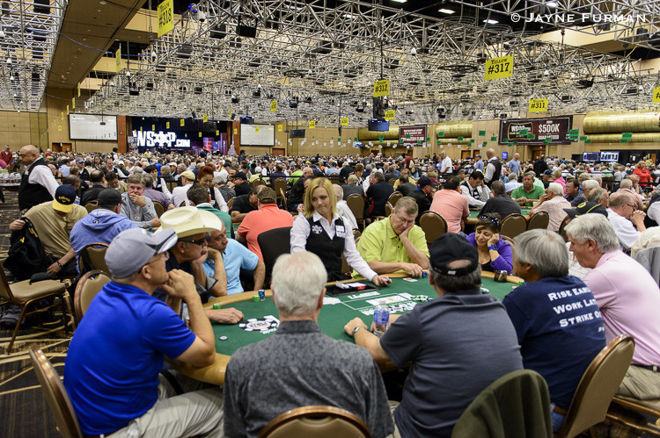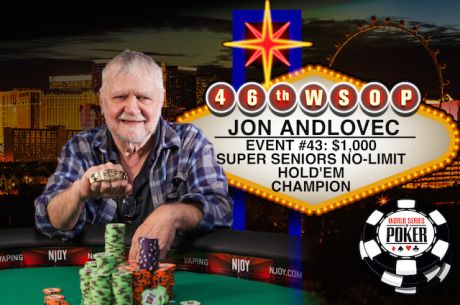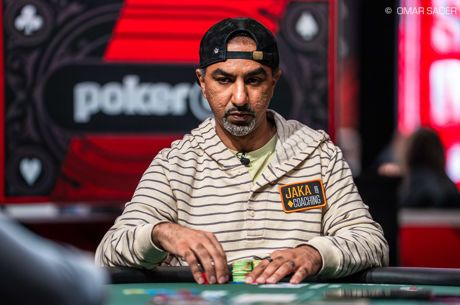Thinking of a Seniors Event? Tips to Make it Fun and Profitable

The 2016 World Series of Poker gets started in just over a week, and for a considerable segment of the poker-playing population, the $1,000 buy-in Seniors No-Limit Hold'em Championship starting Friday, June 17 is a highlight of the schedule.
Two recent events got me thinking about seniors' poker tournaments. First, I turned 55 last month, which means I've been playing such tournaments for five years now �� since my initiation at the seniors' event of the 2011 WSOP, to be exact. (Like many seniors events, the WSOP has a minimum age requirement of 50 for its seniors event.)
Second, a WSOP Circuit series was just held at what is now my closest casino, Harrah's Cherokee, and my girlfriend and I played in both of its seniors' events on consecutive Sundays.
On the drive home, we got to talking about how strategy for seniors' tournaments differs from the approach to standard tournaments. My girlfriend is a wise woman, and she offered this observation (her ideas, my words):
The range of player types in a seniors' event is much more limited than in other poker tournaments. In fact, with few exceptions, the players can be lumped into one of three types, and your main strategic task is to classify your opponents into one of the three categories.
They are:
1. The really good players
In seniors' events, these constitute an even smaller portion of the field than in open events. You'll rarely have more than one with you at a table, and the most common number you'll have is zero, so this is the smallest of the three categories.
2. The nits
This is a classic poker type (not just among older players), and therefore easy to spot. They play a narrow range of opening hands, especially from out of position. They limp, check, and call often when they should bet or raise. They usually play a "fit or fold" strategy when the flop comes. They tend to neglect implied odds in a no-limit structure, and so won't pay much for a draw.
Cashing matters to them more than winning, so they'll play an ultra-low-risk game near the money bubble, trying to survive. Socially, they are typically (though not always) marked by a quiet demeanor, less-than-average chatting, neat and precise chip stacks, and carefully repeated, even stereotyped mannerisms.
3. The splashers
These are the ones who are just there to have fun. They'll be in many more pots than the nits, though not necessarily with any more aggression. They're far more likely than the nits to call down an opponent's bets with mediocre hands, because folding is no fun. If they make it into the money, well, that's icing on the cake, but they're not really expecting it. That's not the main purpose of playing for them, and their game is not optimized to that outcome �� let alone to taking the top prize.
Virtually opposite to the nits, they'll pay almost any price for a draw, because it's so much fun when they hit. Socially, they're the ones chatting and laughing with the other players. Their play can't be characterized as creative, but it can be erratic and unpredictable.
It's hard to say whether you'll run into more nits than splashers, or vice-versa; it varies a lot from one tournament to the next.
How to Play Against All Three Groups in Seniors Events
Once you have put one of these three labels on the people at your table, your play against any one of them at a time becomes perfectly obvious.
For the nits, that means betting and raising them �� with nothing, if that's what you have �� until they fold. On the rare occasions that they play back at you, back off unless you have something close to the nuts.
For the splashers, dial down your bluffing to a much lower level, because they'll call out of curiosity, suspicion, and hope. They'll often check down hands with you, rather than taking charge of the hand when you give them the opportunity. They may show aggression, but it's often with conspicuous bet-sizing and/or behavioral tells that are relatively easy to exploit.
For the really good players, well, there's no easy-to-follow recipe for them �� which is exactly what makes them good players. You just have to be on your game for reading the situation and pressing edges when you have them. Because you'll probably have seven or eight easier targets, it's usually best to deal with them by heeding Shakespeare's advice from Henry IV: "The better part of valor is discretion."
Other Practical Suggestions for Seniors Events
So that's the main strategic approach. Then there are a few practical suggestions that can make the day go by more easily.
First of all, speak up! Hearing loss is a nearly universal malady of advancing age. To make matters worse, the environment of a large tournament room is exactly the kind in which the specific hearing losses are most prominent �� lots of voices competing for attention and lots of background noise.
All sorts of problems related to misfiring communications can be avoided if you deliberately step up the volume with which you announce "Raise" or "All in." Your goal should be to feel like you're just a little short of shouting.
Also, be patient. The pace of the games in seniors events tends to be a bit slower than others. Don't waste your attention and emotional energy on wishing people would be quicker with their actions. The flip side, however, is that you'll run into almost none of those annoying players who tank every damn time it's their turn, just because the cool kids are doing it �� so count your blessings.
Next, plan your restroom breaks. The plight of older people's bodily functions is the source of no end of humor at their expense (including, I might add with disapproval, in nearly all live-blogging of seniors' events from the poker media). But it's a very real issue. When it's your turn to stand at a urinal for several minutes with an uncomfortably full bladder but no results, while a long line of people is waiting, you may suddenly decide that enlarged prostates aren't as amusing as you once thought.
The lines at the men's room (this is one situation where women have the advantage, due to their fewer numbers) can grow so long in seniors events that if you won't be able to manage to be one of the first to get there, it might be worth planning to go when the tournament is not on break. You may miss fewer hands that way, and it will be a situation where the missing occurs under your control, rather than when you're at the mercy of a hundred people in front of you.
Finally, compared to open events, the fields in seniors' events are usually softer and the company more enjoyable. So if you qualify for entry but have never tried one, I heartily recommend it.
Robert Woolley lives in Asheville, NC. He spent several years in Las Vegas and chronicled his life in poker on the ��Poker Grump�� blog.
Want to stay atop all the latest in the poker world? If so, make sure to get PokerNews updates on your social media outlets. Follow us on Twitter and find us on both Facebook and Google+!









